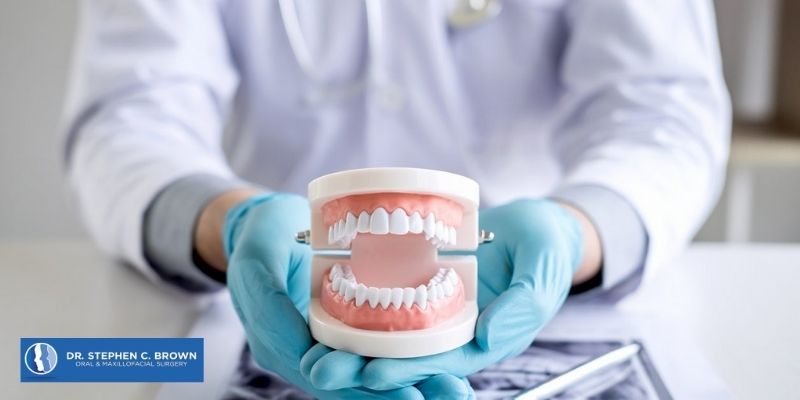Dental Implant Surgery for Missing Teeth
In modern-day dentistry, dental implant surgery using artificial body parts is considered the standard of care in the replacement of missing teeth. The cause of missing teeth could be tooth decay, gum disease, or injury. Nevertheless, dental implant surgery for your missing teeth is a long-term solution because the implants are fixed in your jawbone. It is just like your natural teeth and can last a lifetime if properly cared for. A dental implant is a titanium screw that is fixed into the upper or lower jawbone through a surgery. Due to titanium's biocompatibility properties, the fixture fuses strongly with the bone for some weeks or months. This process of bonding between the dental implant and jawbone is known as osseointegration. Osseointegration is simply why implants never move out of position. It is also the reason why bone loss is not usually a problem. Once the implants are healed completely, a dental crown is placed over them.
Dental implants are a very reliable type of tooth replacements, and they are a permanent solution to missing teeth. The procedure is used as solutions to replace either single or multiple missing teeth in a different area of the mouth. The titanium implants used replaces the root of the missing tooth. It also forms a secure foundation for the new teeth. These replacements always look, feel, and functions like your natural teeth. Depending on various factors, the cost of dental implants varies. The state of your teeth, gums, and jawbone can also affect the cost of dental implants. If a bone graft is needed for implant surgery, the cost will be higher. However, the estimated average cost for a single tooth ranges between $3,000 and $6,000. With the advancement in science and technology over time, the outcome of dental implants has greatly improved.
Dental Implant Procedure
It takes several months to complete the dental implant procedure. A healthy gum, teeth, and jaw tissue are requirements that need to be met before undergoing this procedure. The surgery also requires that the candidate have a very strong immune system.
Once the candidate passes the required criteria, he or she will be prepared for local anesthesia. To start with, a surgeon will make a small incision along with the gum, and a titanium rod is firmly placed into the jawbone. Once the titanium rod is fixed firmly in the jawbone, the incision is closed. The titanium rod is the dental implant here. It will serve the function of a natural tooth root. To stimulate faster healing and enhance stability, a special and modern approach to surgery is used. However, the success of the tooth implant procedure is dependent on the implant fusing well with the jawbone. For the next several months, the dental implants integrate well into the bones and gums. To offer protection to the area after surgery, a temporary tooth replacement can be put over the implant.
After surgery, the next stage is the final restoration. This comes some months when the implants have properly integrated into the jaws and gums. Afterward, the surgeon will place a dental implant crown and an abutment over the top. This will provide the look and function of the natural teeth. Its care involves using a soft brush in cleaning your teeth twice a day. Note that the healing time depends on different factors like the kind of dental implant, bone health, and physical condition of an individual.
The Benefits of Dental Implants
Unlike other dental appliance that artificially replaces missing teeth, dental implants have so many benefits. Their advantages may include:
1. Improved Appearance:
This is the biggest advantage. The replacement teeth look and feel exactly like the natural teeth. They can be long lasting if properly cared for. Since they are developed to fuse with the bone, they become permanent. Also, the jaw bone that shrinks when missing teeth are not replaced does not happen with dental implants. The facial contours that those missing teeth cause is non-existent here. Dental implant reduces bone loss and aids in preventing the process.
2. Improved Speech:
Some other dental fittings can move out of position when functioning. This can cause the teeth to slip. It results in mumbling or slur in speech. With dental implants, this does not occur. Dental implants will not slip when the mouth is functioning. It invariably improves your speech.
3. Improved Chewing:
Dental implants are like natural teeth; they do not slip. This allows for easy chewing and eating your favorite food without pain.
4. Improved Comfort:
The discomfort of removable dentures is eliminated with dental implants since they become part of you.
5. Improved Self-Esteem:
With a set of perfect teeth, you can have your smile back. Dental implants can help you feel better about yourself, thereby improving your self-esteem.
6. Improved Oral Health:
Dental implant does not allow grinding with other healthy teeth. This is because they are fixed and they remain in the position in which they are placed for a long time. Thus, other teeth are secured and your general oral health is generally improved for the long term.
7. Durability:
With proper care, dental implants will last for many years, in fact, a lifetime in most cases. They are very durable.
8. Convenience:
With dental implants, you do not need to worry about the embarrassment of removing pieces or replacing them.
Conclusion
When it comes to missing teeth, dental implants are the best option since it functions like your natural teeth. They are designed to be a permanent solution for missing teeth. However, you must meet some criteria to be suitable for the procedure. You need to have a strong immune system and be in peak physical condition for surgery and recovery. The right time to have dental implants is if you have a lost tooth already. This is because you are more at risk of further teeth loss. A dental implant offers protection to your smile by filling in the gap with a false tooth that looks natural. They are also great for patients who are conscious of their missing teeth. It also offers several benefits such as no restriction in diet, preservation, and prevention of bone loss, less discomfort in eating, and many more.






Comments
Post a Comment